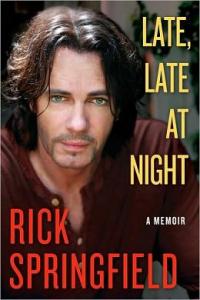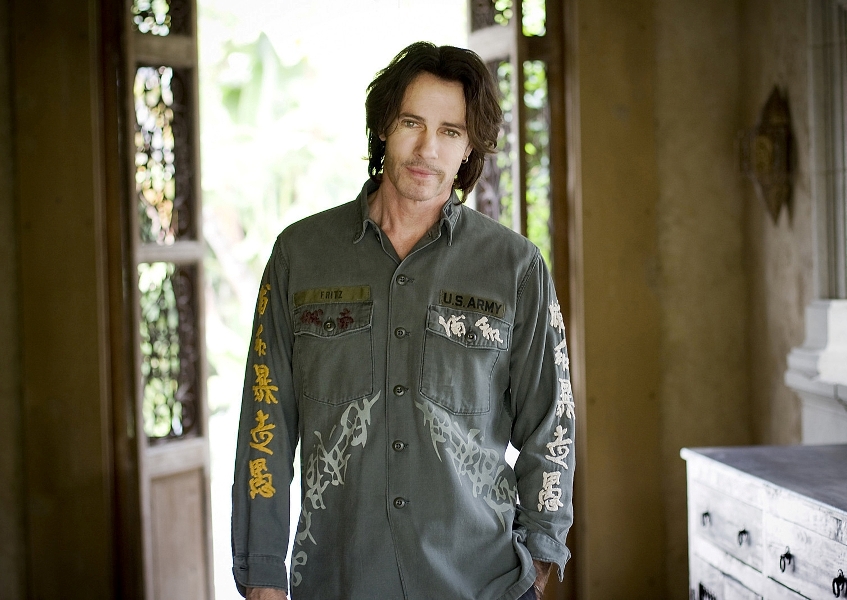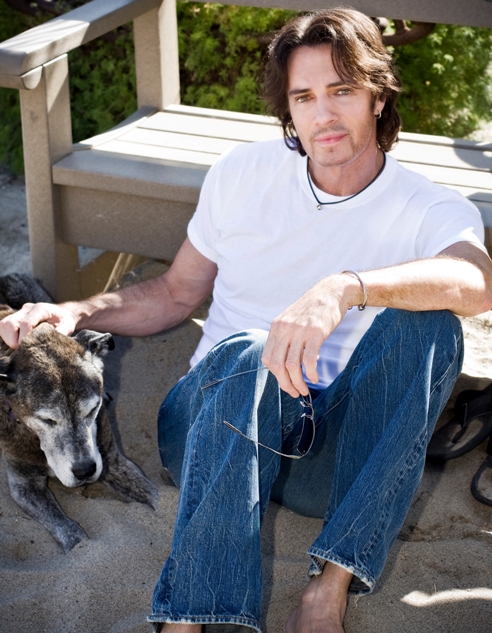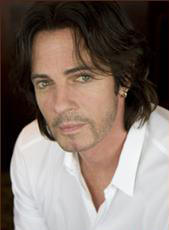To look at him,
even today (and he’s looking pretty kick ass for age 61), you would
never know that Rick Springfield has been battling the demons of
depression since his childhood in Australia.
“I had a little
inkling [about depression] when I tried to off myself,” he tells me
from his home in Los Angeles. “I was hanging myself in my parents’
garden shed at age sixteen or seventeen, so I had a pretty good idea
that there was something going on then. But I didn’t understand. I
never heard the word depression. I actually didn’t hear it until the
‘80s. Until the ‘80s, I didn’t realize that it was maybe something
that was there for good, for life. I was a moody person.
“It was right at
the height of puberty and I wasn’t doing well at school and I had no
friends. I felt very unattractive and unpopular. I was staying away
from school and I was just going down and down and down. It was a
downward spiral. And one day, it just got [to be] too much, and I
went out to the shed.
“Luckily, the
rope came untangled from the beam that I tied it to. I wouldn’t have
had the story to tell. So I challenge anyone who is thinking of
[suicide] to give it a little time, because things will change. If I
could be an example of that, then there was a reason for me putting
it in the book other than shock value.”
Fortunately for
Springfield, it was all uphill from there, but the skies didn’t
exactly clear for him. The book of which he
speaks, Late Late At Night (Touchstone Books) is a
self-examination of his life, his career and his chronic depression.
It has struck a definite chord with a larger audience than just his
millions of fans, as it has been listed
on The New York Times
Bestseller List.
The
career-making role of Dr. Noah Drake on General Hospital
(when that soap was the hottest show on television),
combined with the mega-success of his
signature 80s album, Working Class Dog (1981) assured his
place in pop music and TV history. Nevertheless, his dance marathon
with depression actually, surprisingly jet-propelled his ambition.
 “I’ve done a lot
of pretty in-depth therapy, so I’m fairly clued in to what’s going
on inside,” he tells me, “but there were a couple of surprises.
Seeing a thread of depression from an early age can also be
responsible for some good stuff, like my drive and my will to
succeed. And I think a couple of good songs too.”
“I’ve done a lot
of pretty in-depth therapy, so I’m fairly clued in to what’s going
on inside,” he tells me, “but there were a couple of surprises.
Seeing a thread of depression from an early age can also be
responsible for some good stuff, like my drive and my will to
succeed. And I think a couple of good songs too.”
He must be
talking about, for starters, “Jessie’s Girl,” which naturally is on
the must-play list for all 80s retro parties. However, he was
determined to make his rock-and-roll dream come true long before
that overnight success.
He grew up as an
Army brat in Australia, but dropped out of high school to sing and
play in bands, including a concert tour of Viet Nam at the height of
that country’s conflict.
Shortly
thereafter, he boogied over to Los Angeles in 1972, and recorded a
huge national pop hit called “Speak to the Sky.” This led to, of all
things, a Saturday morning cartoon series on ABC, Mission Magic,
in which he starred as his animated self and performed his own
songs.
His determination
to lose his accent resulted in more acting work.
“That was a whole
psychological thing,” he says of his accent reduction. “[I did
that] in the mid-seventies, when I started acting, because no one
[in America] had ever heard Australian back then. And I wanted to be
competitive.”
It paid off big
time, eventually landing him a regular role as a proto-McDreamy on
the soap General Hospital. Good timing: both the series and
Springfield’s recording career were on the brink of becoming a
cultural phenomenon.
 “It was the
biggest show on TV,” he says. “It was the only show that they
arranged college classes around, because people wouldn’t show up
while the show was on. It was gigantic, and I was very fortunate to
be on it. I serendipitously walked on to the set just about the time
that it was to become huge.”
“It was the
biggest show on TV,” he says. “It was the only show that they
arranged college classes around, because people wouldn’t show up
while the show was on. It was gigantic, and I was very fortunate to
be on it. I serendipitously walked on to the set just about the time
that it was to become huge.”
In a classic case
of cross-marketing, his RCA album Working Class Dog,
featuring “Jessie’s Girl” and “I’ve Done Everything for You,” went
multi-platinum, while General Hospital’s ratings would scour
heights never again seen by an American television soap.
“Now, soaps are
having a little bit of a tougher time,” he says. “Soaps are a lot of
work. People don’t understand how hard soap acting is. Acting and
directing, everything to do with a soap is a 24/7 gig. It’s the
hardest acting gig there is.”
These days, his
life is a bit smoother sailing, including a third-go-round making a
personal appearance on a Bahamas blast called The Rick Springfield
and Friends Cruise.
“It’s a
guilt-free, partying and drinking and playing week,” he says. “It’s
the most fun we have on the road for the year. It’s a really
incredible thing. Kevin Cronin from REO Speedwagon is our musical
guest this year. I have some soap opera friends that will be
representing, and Mark Goodman from MTV is the host. It’s really
become an enjoyable thing to do. We’re there the whole time. It’s
really friendly, and we do a lot of things that we don’t normally do
on the road. We play songs we’ve never played before and have a
question-and-answer session. We end up doing a beach show and then
we all go swimming.”
 Also going
swimmingly is the soon-to-be-released documentary feature Affair
of the Heart, which follows the
yellow-brick road of some of Springfield’s
fans, and how his music has shaped their lives.
Also going
swimmingly is the soon-to-be-released documentary feature Affair
of the Heart, which follows the
yellow-brick road of some of Springfield’s
fans, and how his music has shaped their lives.
“[The film crew]
have been following us around for a year,” he says. “They’re
everywhere, they go everywhere. Everywhere I go, there is a camera
stuck in my face. I think it’s going to be really interesting. It’s
from a fan’s perspective, and what growing up with my music meant to
them. There are a lot of amazing stories. That’s one of the reasons
I got started getting close with some of the fans, because of
hearing these amazing stories, life-changing things, just having a
positive influence through my music around them.
“There was one
woman who was dying. She was in a car accident and her life signs
were going down, and her friend put on headphones [on her] with my
music in it, and her vital signs started picking up. It’s really not
my music; it’s her reaction to my music, and what it means to her.
I’m not saying that my music will cure cancer or anything. It’s
everybody’s attachment to music. It’s very, very powerful. They’re
documenting fans’ testaments to my music.
“I’m one of those
guys who likes to meet his fans. That wasn’t always the way, but now
I realize that it’s not about me, it’s about them.”
Fans may also be
surprised by a new type of music he is recording: lullabies. My
Precious Little One: Lullabies for a New Generation was released
last year on his own label, Gomer Records (named
after his dog), to critical acclaim.
 “I actually wrote
that for my own kids when they were first born, starting in 1985,”
he says. “They were written in a different songwriting period when I
was writing all that stuff in the 80s, so they have that flavor. I
just wrote it for my children. I didn’t write it for anyone to hear
other than my kids. About a year and a half ago, I found the tape in
the drawer and I really liked it, so I re-recorded them. I got a lot
of great memories from it.”
“I actually wrote
that for my own kids when they were first born, starting in 1985,”
he says. “They were written in a different songwriting period when I
was writing all that stuff in the 80s, so they have that flavor. I
just wrote it for my children. I didn’t write it for anyone to hear
other than my kids. About a year and a half ago, I found the tape in
the drawer and I really liked it, so I re-recorded them. I got a lot
of great memories from it.”
His two sons,
Liam and Joshua, now grown, have helped him to stay grounded.
“They’re kids
going on with their lives,” he says. “They’re proud when it crosses
their field. They congratulated me when the book made the NY
Times [bestseller list], so they are aware of stuff going on.
And it’s been that way all their lives, so they just accept it.”
In the meantime,
he is taking it one day at a time, staying one step ahead of his
depression.
“You learn to
deal with it and you learn to cope with it,” he says. “It doesn’t go
away – well, it goes away at times. It’s not like it’s a constant
visitor. It’s like anything else, alcoholism or any of that stuff:
you have to keep watch.”
In the meantime,
he has his family, friends and fans to keep him warm.
“It feels like a
very current career,” he says of what he is doing today. “It doesn’t
feel like a retro career. And I think they [my fans]
feel that too.
They know it’s not just about the past.”
Email
us Let us know what you
think.